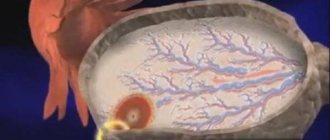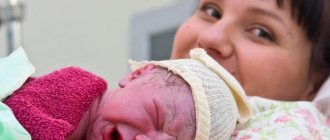Oral contraceptives (OC) in the form of tablets are now so common that about 70% of women of childbearing age take them. Moreover, in some cases, the need for contraceptive hormonal drugs is not due to their direct purpose (protection against unwanted pregnancy), but for the treatment of any diseases caused by hormonal imbalance. When the reasons that caused the need to take OCs disappear, many women wonder what consequences to expect after stopping birth control. Therefore, we will next consider the natural processes in the body and the negative side effects that occur when stopping drugs, how to properly stop taking them, and why the ovaries hurt after stopping them.
What happens when you stop taking birth control pills
When you stop using contraceptives, the body receives a command to stop the flow of hormones from the outside. The brain and ovaries begin to intensively produce the necessary sex steroids to restore the menstrual cycle and achieve pregnancy. Some experts call this process the rebound effect. This means that after a long rest, the reproductive system reacts with special “zeal” to the abolition of contraceptives and is maximally activated. In this regard, infertile couples are sometimes recommended to take COCs in order to increase the likelihood of natural conception after completing the course.
How OK works
To understand why certain consequences appear after discontinuation of OCs, it is necessary to understand how these drugs affect the reproductive system.
OK are synthetic hormones that suppress ovulation and change the ratio of FSH. When the hormonal composition changes, the structure of the endometrium becomes different. Cervical mucus is also affected - it becomes very dense, forming a kind of plug in the cervix, separating the sperm from the egg. Even if he manages to pass this obstacle, the zygote will not attach to the uterine wall.
If a woman takes OK, the key functions of the ovaries seem to be turned off, and all the work is assigned to synthetic hormones. When, after discontinuation of contraceptives, discomfort in the ovaries is recorded, this means that they are returning to natural activity. Before drawing conclusions, it is recommended to observe your condition for several cycles.
How to stop taking birth control pills correctly
To stop taking hormonal contraception, you must completely finish the pack of medication and not start a new one. As a result, after stopping taking contraceptive capsules, menstruation will occur, recreated by the drug. Then the supply of hormones from the outside stops and the woman’s body has a whole month to restore natural biorhythms, which is the most physiological. Normally, menstruation will return on its own within 1-2 months. Full regular ovulation comes a little later: after 4-6 months.
There are no other oral contraceptive withdrawal regimens. Gradually reducing the dosage, taking birth control pills every other day and other possible options are nothing more than fiction.
Important! Cancellation of contraceptives in the middle of the cycle is possible only during pregnancy and the development of serious adverse reactions, the occurrence of diseases when taking contraceptives is contraindicated: thrombosis, cancer.
Is it possible to suddenly stop taking birth control pills?
Abruptly stopping the use of tablets can lead to disruption of hormonal regulation. In this case, a prolonged menstrual-like reaction often develops. Prolonged bleeding in especially severe cases requires hormonal homeostasis.
Important! You can get pregnant after stopping COCs in the first cycle. If stopping the use of birth control pills is not related to family planning, then the contraception should be replaced immediately.
What happens if you stop taking birth control pills?
If stopping the use of contraceptives is caused by the development of adverse reactions or pregnancy, then you should not wait until the end of the package. With this option, the potential health risk is higher than birth control pill withdrawal syndrome.
In other cases, stopping the use of contraceptives is recommended according to the standard scheme: after the end of the last tablet of the package.
Cancellation of contraceptives after long-term use
Many modern studies prove the inappropriateness of stopping contraception for the so-called break or rest from hormones. It is believed that wave-like use of contraceptives poses a great threat. Therefore, extended contraceptive regimens have been developed: 3-6 months with seven-day use of empty capsules.
Cancellation of hormonal contraceptives after long-term use is no different from the standard method.
Wrong reception
Contraceptive drugs belong to the hormonal group. Ideally, they should be taken only after being prescribed by a doctor, who will choose the right remedy individually for each patient, depending on the results of laboratory tests for hormones.
The essence of the action of such drugs is to suppress certain hormones in a woman’s body that are responsible for the maturation and fertilization of the egg. You must use hormonal medications carefully, strictly following the dosage prescribed by your doctor.
It is strictly forbidden to suddenly stop taking contraceptives. One of the most common reasons why the stomach hurts after stopping birth control pills is a sudden cessation of the use of oral contraceptives.
If a woman decides to conceive a child and stops taking contraceptives, it is necessary not to sharply, but gradually reduce the dosage of the drug. Before stopping medications, it is better to consult a doctor who will prescribe a course of taking the drug for its withdrawal.
This measure will help the hormonal system adapt to the new mode of operation; the endocrine system itself regulates the production of substances, the concentration of which needs to be increased or decreased.
Side effects from stopping birth control pills
In most cases, after discontinuation of contraceptive medications, the recovery period proceeds unnoticed. However, in the presence of diseases of the reproductive sphere, there is a deterioration in the condition, the return of symptoms with greater force. Women complain of increased PMS, pain during menstruation, irregular discharge and an increase in the amount of blood lost. Such manifestations are considered side effects during the withdrawal of contraceptives, if the patient did not suffer from hormonal disorders before starting to use contraception. Usually, after the functioning of the reproductive system is normalized and the withdrawal syndrome is eliminated, the complaints disappear.
Stopping birth control pills quickly causes the following side effects:
- apathy, weakness, depression,
- acne, increased work of the sebaceous glands (the head becomes oily faster, shine appears, acne on the face),
- increased hair growth,
- pain in the lower abdomen,
- menstrual irregularities for more than 3 months,
- breakthrough uterine bleeding due to withdrawal,
- nausea and vomiting.
With mild withdrawal of birth control pills, short delays, intermenstrual bleeding, increased PMS, and increased oily skin and hair are more common. Usually, after a recovery period, the disorders resolve without additional treatment.
Test: How good is your health?
Lower abdomen hurts after stopping birth control
Abdominal pain can cause the following consequences after stopping birth control pills:
- uterine bleeding,
- strengthening of PMS,
- increase in the volume of blood lost,
- return of symptoms in the presence of diseases of the reproductive system.
The appearance of pain is associated with excessive work of the hormonal system and the return of the usual algomenorrhea and PMS, which is more often observed in patients who had such problems before starting to take the pills. Adverse withdrawal reactions are highly individual and unpredictable. Some patients who received tablets for therapeutic purposes, after completing the course of drugs, noted a complete absence of unpleasant symptoms.
Urgent contraceptives and their features
When using urgent ok, escapelle, and other medications, the ovaries do not slow down. On the contrary, under the influence of hormones (with one-time use) found in contraceptives, female organs intensively fight against “unnecessary” foreign bodies. The body protects itself in advance by bringing the ovaries to work, which causes untimely menstruation. In this case, the chest, lower abdomen, and head may hurt.
After abrupt discontinuation of contraceptives, the work of the ovaries can increase significantly. Hence the severe pain in the gland, sometimes in the back. Among emergency contraceptives, there are those that are suitable for different phenotypes of women:
After stopping the use of Postinor, Escapel and other urgent medications, at least 4 weeks should pass. It is not recommended to use them every month, as they disrupt the biological stage of menstruation and also cause pain and discomfort during subsequent menstruation.
When using postinor and escapelle more than 1-2 times a month, a woman, even after stopping use, develops thrush and fungus in the genitals.
After stopping the use of Postinor, Escapel and other contraceptives, the size of the glands is not restored. This threatens the development of mastitis when feeding a child, cancer, and benign tumors. In the absence of a “set” of artificial hormones, the body “sees an excess” and stops working and providing all the conditions for conception. “You wanted protection, you will get the body’s natural production of anti-stress.”
Consequences of discontinuing hormonal contraceptives
Stopping the use of birth control pills does not go away without leaving a trace. The body gets used to the reduced functioning of the sex glands. A sudden refusal of hormonal drugs leads to stress. In most cases, the body quickly adjusts to a new rhythm. However, in some categories of patients, stopping the pills causes certain problems.
The most severe complication of long-term use of birth control pills is ovarian hyperinhibition syndrome. In this case, the patient notes amenorrhea, not accompanied by any other symptoms.
Hormonal imbalance after stopping birth control
Activation of the brain's releasing systems after blocking caused by the flow of progesterone and estrogen, in turn, provokes the release of FLH and LH. With proper abolition of birth control pills, such a release triggers the beginning of a new menstrual cycle: follicle growth begins and the endometrium is transformed.
If you suddenly stop taking birth control pills, the risk of developing hormonal imbalance increases. The situation is further aggravated by the fact that after stopping oral contraceptives, ovulation may not occur immediately. As a result, there are delays in the first months.
Hormonal contraceptive withdrawal syndrome
Sometimes stopping birth control pills has certain consequences or provokes the so-called withdrawal syndrome. Women complain of changes in mood, increased appetite, deterioration of skin condition, and the appearance of especially strong PMS. In general, patients note a deterioration in their general condition.
Peculiarities
The modern pharmacological industry offers women a wide range of oral hormonal contraceptives with different compositions and properties. A special place among such pills is occupied by emergency contraceptives.
Such medications do not inhibit the functioning of the patient’s ovaries. The tablet contains special hormones that stimulate the patient’s reproductive system to fight unwanted foreign bodies.
Even one small tablet of emergency hormonal contraceptive leads to menstrual bleeding. A woman often experiences discomfort in the chest, groin, and lower back. The ovaries of a woman without OC become more active, which is why unpleasant sensations arise.
Urgent OCs can be used no more than 1-2 times a month. Such drugs can lead to the development of menstrual irregularities and thrush. The danger is that hormonal fluctuations in a woman’s body can lead to changes in the size of the mammary glands, the development of mastitis and even oncology.
Restoring your cycle after stopping birth control
It is believed that after stopping the pills, menstruation should return within the first 3 months. In most cases, this is exactly what happens. However, not all of these cycles are considered complete, and not all cycles involve ovulation. Monthly ovulation, confirmed by ultrasound by the formation of the corpus luteum, is restored within six months. In the absence of menstruation, irregular discharge, and the appearance of blood between cycles, a hormonal imbalance occurs.
When menstruation returns, the length of your cycles may increase, decrease, or remain the same. If the duration of the cycle after stopping the pills falls within the range of 21 to 35 days, there is no need to worry. If you deviate from these parameters, you should visit a doctor and find the reason for the changes in regulation.
Life after hormonal contraception
Many women have been taking OK for many years. As a rule, as prescribed by a doctor. In some cases - after passing the appropriate tests. But it often happens that you come to see a doctor and say that you want to take OK.
“Nivapros,” says the doctor. - Drink these.
- A….
– If they don’t fit, then these are the ones.
And the woman goes to follow the doctor’s advice. There is another option to go to a paid clinic, but only a few go there, compared to the general mass.
If a woman lives with one partner for many years, then this method of contraception usually suits her. There is no need to think about what day of the cycle it is, whether you bought condoms or not, and whether he will have time to pull out.
I took a pill and forgot about the problem.
Often, taking these pills lasts for several years, especially if there are no obvious health problems.
The main advantages of OK:
– prevents unwanted pregnancy by 99.99
– have a positive effect on the condition of the skin, hair, nails (the so-called antiandrogenic effect)
– eliminate PMS and balance overall hormonal levels
What happens to the body while taking OK:
The hormones contained in OCs suppress the synthesis of their own gonadotropic hormones and inhibit the functioning of the female reproductive system, and natural pregnancy becomes impossible, because
According to the mechanism of their action, OCs imitate pregnancy in a woman’s body.
Thus, while taking pills, a woman’s body exists in two states - early pregnancy and post-abortion, and it is clear that such a “swing” does not add to health.
As a rule, when any hormonal substance enters the body, a malfunction occurs in the activity of the entire well-functioning system, which is the human body. As a result, many processes lose stability.
, because instead of optimally and productively interacting with each other, internal systems establish artificial, rough connections that function forcedly. That is, the body is subjected to functional violence.
When a woman takes OK, her own reproductive system stops producing these hormones on its own. It is quite understandable why do extra work if the hormone is present in the body in the required quantities.
If such a picture does not last long, then everything is still fixable, but with a long-term disturbance, dysfunction of non-functioning glands can (and does) occur.
Those. In the body, natural hormones are replaced with “crutches”. And when you remove these crutches, your body will have to make an effort to restore what has not been used for a long time.
So, OCs suppress the synthesis of gonadotropic hormones in the female body, which are responsible for ovulation (ovum maturation). But sometimes there are cases when ovulation still occurs while taking OK.
If this case is isolated, then there is no reason to worry, you can continue to take the pills.
If this happens more than once, then you need to visit a doctor and think about changing pills (if you still want to take them).
The longer you take hormones, the more they suppress the natural functioning of your body and the more problems appear.
The main thing is libido disappears. Not right away, no. Gradually.
If, for example, a woman takes OK for 5 years without a break, then somewhere in the third year sex already turns into a “compulsion” - the hormonal levels are even, ovulation does not occur, and if there is no ovulation, there is no desire to have sex (“continue the family”) . It turns out to be a paradox - they take OK so they can have sex without problems, but they don’t even want sex...
An important nuance: after 35 years, women are not recommended to take OK.
What is the harm from taking OK:
– oppression of the reproductive system
– thin the endometrium
– most often negatively affect the female body (decreased libido, weight gain, cellulite, vascular problems)
– increase the risk of thrombophlebitis
What happens to the body when OC is discontinued?
Many women do not perceive OCs as a medicine and often simply forget to name them when, for example, the doctor asks - are you taking any medications? But these are lyrics.
So, cancel.
That's right: drink the blister to the end and stop.
Wrong: quit halfway through or start crushing the tablets to reduce the dose “so that the body gets used to it”
In the first three months of withdrawal, you will experience the “joy” of your hormonal system going wild. Hormones are a natural regulator of most processes in the body, and you kept it at a stable dose for several years, and then suddenly this dose does not arrive. And a so-called hormonal imbalance occurs.
During the first six months of stopping OCs, all dormant diseases in the body can emerge. Do you have a family history of joint problems? receive and sign. With your stomach? Please. I’m not even talking about neuroses and other joys of life - no arguments or calls for calm will help when you literally pull a bunch of your hair out of the bathtub drain.
The first month of withdrawal - it seems like nothing is happening. But it only seems so. The body begins to try to start metabolic processes without the usual doses of pills. Do you like headaches? And she you. The most common withdrawal symptom in the first month is headache.
To support the body, it is advisable to start taking vitamins. Ideally, of course, withdrawal should be carried out under the supervision of a doctor, but there are cases when this is not possible. Take the vitamins you usually take. The best special complexes for women are Perfectil, Merz, Alphabet - it all depends on your wallet.
It is also advisable to take a course of hepatoprotectors before or after a course of vitamins (if you don’t want to poison your body further with pills, drink milk thistle oil, either in capsules or liquid).
The second month of withdrawal - if the critical days came almost on time (fluctuations of 2-3 days in any direction are not considered a deviation from the norm), then the body is relatively healthy and ready to resist. (if the patient wants to live, medicine is powerless).
It is advisable to take herbal sedatives in small doses - valerian, motherwort - from the end of the second month. In small ones! because they have a cumulative effect. Depending on your body, during this period you will either begin to lose weight or, on the contrary, gain weight.
The appearance of inflammation on the skin – acne vulgaris.
For some, skin inflammation begins to appear immediately in the first month of withdrawal. But again, for most this is the second month.
We will consider further considerations taking into account the amendment that a woman’s body is generally healthy and is between 30 and 35 years old.
The third month of withdrawal is the most interesting thing - you begin to feel ovulation. Yes Yes. These aching pains in the abdomen (not severe) are not intestines. And not appendicitis. This is your ovulation. And the fact that you feel it is also good, it means your reproductive system is still working.
Fourth or fifth month of withdrawal - everything seems to be going well. Acne gradually goes away, the pain of ovulation decreases and libido begins to recover.
During this period, it is advisable to undergo a thorough examination by a gynecologist, do an ultrasound, donate blood for gonadotropic hormones and thyroid hormones and insulin. Everything is fine? Amazing.
And now the most unpleasant part. By the end of the fifth month, heavy hair loss begins. In two months you can lose about a third of your hair and then the loss will slow down slightly.
It is recommended to take sedatives and multivitamins again. Hair loss will return to normal within 3-4 months from the onset of hair loss. And new hair will grow too.
True, their structure may change (for example, they will begin to curl).
The sixth month of withdrawal - by this period the cycle should have settled down (let me remind you that fluctuations of 2-3 days are the norm).
According to most doctors, hormonal levels should more or less return to normal after six months. But this is ideal. In reality, everything is a little worse - hormone fluctuations can last up to two years.
During this period, it is advisable to be more attentive to your health. Get enough sleep. Eat properly. And the body, if it is relatively healthy, will recover.
Source: https://pikabu.ru/story/zhizn_posle_gormonalnoy_kontratseptsii_6120253
Reviews of side effects after stopping birth control pills
Smirnova Tatyana Ivanovna, 28 years old, town. Bezenchuk Diane drank for almost two years and decided to take a break. When I stopped taking birth control pills, my lower abdomen began to hurt and I felt severe dizziness. The symptoms lasted for almost a month, so I contacted my local gynecologist. The doctor said to wait until the hormonal levels are restored. I took painkillers every day, the complaints stopped after the first menstruation, from which I was ready to climb the wall. Now I don’t notice any violations. Kosmacheva Evgenia Sergeevna, 32 years old, St. Petersburg During a routine examination, adenomyosis was discovered, the doctor prescribed Yarina. I spent the first month following the regimen, although I didn’t feel well. The doctor warned that the first two months could be difficult while the body gets used to the pills. The next month I took one birth control pill from a new pack and quit; I couldn’t stand it: nausea, dizziness, weakness, aggression. Tomorrow I will go for an examination to choose a different treatment method.
Causes
Many women complain that stopping regular use of hormonal pills provokes pain in the lower abdomen and chest. It is these parts of the female body that react especially acutely to the slightest disturbances in the functioning of the body.
Any contraceptive contains a certain set of hormones. Such substances affect the functioning of the reproductive system and mammary glands. When additional hormones stop flowing into the body, a woman may feel pain and discomfort.
It's quite normal. Your body has set up a stable defense against sperm penetration into the egg, but then suddenly finds itself without a barrier. Now he will have to produce hormones on his own, and this leads to a certain stressful situation.
Taking oral contraceptives continuously may be harmful to your health. The body will get used to the fact that it does not need to produce hormones on its own, which will have an extremely negative impact on the functioning of the mammary glands, ovaries and other organs responsible for fertilization. With long-term use and abrupt discontinuation of OCs, the patient may experience the following unpleasant consequences:
- Insufficient functioning of the fallopian tubes;
- Changed composition of mucus in the cervical canal;
- Pathological changes in the endometrium;
- Diseases of the uterus leading to infertility.
Regular use of hormonal drugs can completely destroy female reproductive functions. That is why oral contraceptives should be selected only by a professional gynecologist, in accordance with the individual characteristics of the patient’s body.
You need to take the pills at the same time, according to a clearly established schedule. If you decide to stop taking OCs, be sure to discuss this issue with your doctor. He will tell you how to do it quickly and without any consequences.
Doctors' opinion
Modern hormonal pills can solve many gynecological problems, while simultaneously being one of the most effective contraceptive methods. The greatest difficulty is the rational selection of contraceptive capsules. There is no single scheme or analysis that allows you to choose the optimal drug on the first try. When properly selected and used, hormonal pills cause less harm than abortion.
Stopping birth control pills also requires caution. In this case, it is impossible to accurately predict the frequency and severity of withdrawal symptoms. It has been noted that in most cases, in healthy women who choose COCs for contraceptive purposes, disorders occur less frequently than in patients with existing abnormalities of the reproductive system.
Important! The prescription and discontinuation of contraceptive drugs is carried out under the supervision of a physician.
Consequences of abruptly stopping medications
In addition to the main problems of stopping taking Escapelle, Postinor, the drugs Coc and Zhanine, consequences may develop - a delay in the menstrual cycle, which will not work without the “help” of contraceptives. Amenorrhea is also likely to develop, when menstruation completely disappears, regardless of age or pregnancy. If the girl has not given birth yet, she will feel severe pain and cramps. They often appear in those girls who have used coke and coke-containing drugs.
Combination drugs are not aimed at the individual body; as a rule, they are selected by women themselves. A doctor, and only a doctor, should prescribe the use of coca, postinor, esapela, since everything must correspond to the phenotype of the body, the structural features of the uterus, tubes, etc. If pain and severe spasms are noted, you need to check the genitals for pathologies.
There is a high probability of developing pathologies in the following:
- Gonorrhea.
- Syphilis.
- Hepatitis.
There is a possibility of developing thyroid disease. In order not to provoke consequences, not to cause pain when you stop taking Postinor and Escapel, you need to stop using them at the end or beginning of the cycle, not in the middle.
A common complaint of women who use oral hormonal drugs for contraception is that the lower abdomen hurts after birth control. Depending on the intensity of the pain symptom and its duration, this condition can be considered a variant of the norm or indicate pathology.










